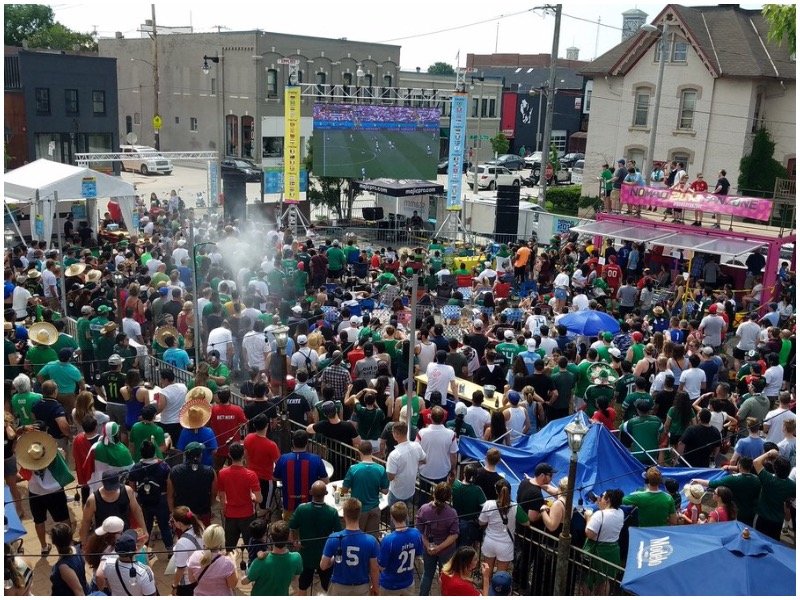As far as I can tell, the beautiful game has two primary problems vis-à-vis the United States: its lack of popularity (relative, that is, to the National Football League, National Basketball Association, Major League Baseball and major college sports), and the US team’s relative lack of success on the international stage, most recently a failure to make the knockout stages of the 2006 World Cup.
For the former, I have in mind a hopeless suggestion, and for the latter I have at least an explanation.
Whenever one discusses soccer's unpopularity (again, relatively speaking) in the States, the conversation usually starts and stops with how "boring" the sport is, or some variation of the boring charge: "There's not enough scoring", "It's too slow-paced", etc. At one point, I probably spouted these same sentiments while hoisting a beer during a Brewers or Packers tailgate party.
I have changed my mind on this count, however. Though scoring opportunities are rare, they are often breathtaking. For instance, Zinedine Zidane's oh-so-close header in the 104th minute Sunday, which was artfully punched away by keeper Gianluigi Buffon to save the Cup for the Italians.
And if you watched any of the games in public -- even a routine game during the Group stage -- you undoubtedly recall the gasps that accompanied anything resembling a scoring chance. The cynics will say that spectators may be gasping from shock, and there is some truth to the charge; scoring chances are rare. But playmaking in soccer is also genuinely exciting.
However, there is one area in which I believe the critiques are justified, and it was on full display Sunday: there is no equitable, sporting way to break a draw in soccer (and the other part of this equation is that there are too many draws to begin with). Ending a World Cup championship on penalty kicks is akin to finishing the seventh game of the NBA Finals with a free-throw shooting contest ... or holding a home-run derby after the 11th inning of a tied World Series game. France hit the post on a penalty kick after 120 minutes of exhausting play, Italy did not. Is Italy therefore better than France?
OK, sporting outcomes are not always clear-cut. And someone has to win, right? In the NFL, a 190-pound kicker can decide the outcome after 59 minutes and 45 seconds of hard-fought play between incredible athletes weighing nearly twice as much. And kickers can hit an upright just like strikers can hit a post; this isn't "fair" either. But there is one primary difference: NFL games rarely end with 6-3 or 3-0 scores, so a late field goal is often a small fraction of the game's overall scoring. Soccer games often end in 0-0 or 1-1 draws, which means penalty kicks are disproportionately important to the outcome.
So what to do? Play on until someone finally scores in overtime? Maybe, though that is probably impractical. Perhaps there is a way to loosen the defense and increase the likelihood of a goal -- say, reducing either side to 7 players (plus a goalie) in extra time. Modifying offside rules during extra play? This would have the dual effect of clearing up confusion for many American viewers, since they don't understand the rule anyways (We pause to offer an aside to eager comment-posters: I actually understand the rule). Or perhaps allowing both sides additional set pieces or free kicks based on the number of shots on net during the game?
I'm just throwing ideas out there -- presumably full-fledged soccer fans can come up with something better. But I strongly suggest avoiding the line of thinking that the New York Times' columnist George Vecsey displayed in his Cup analysis on Monday: "And I'm not even discussing possible alternatives to the shootout, nor am I responding to e-mail messages suggesting other ways to break a tie. Shootouts are part of the game; deal with it."
To put it succinctly, I respectfully disagree. Why not try to find something better?
Now, explaining our lack of success in international soccer is a far easier proposition, not to mention a perfectly American one: there's no money in it.
You've heard the questions during this Cup: Why can't we produce a sublime striker like France's Thierry Henry, a goalie like Italy’s Buffon or a young star like England's Wayne Rooney?
We can, of course, except they're not playing soccer. Is Henry any more spectacular than Reggie Bush? Is Buffon more graceful than Dwyane Wade? Is Rooney athletically superior to Michael Vick?
The answer to all three questions is no. And Bush, Wade and Vick have simply applied their American talents in the American markets that offer the biggest rewards. We will field a world-class soccer team when we field a world-class professional league that can compete favorably with those found in Europe. And this competition must extend from the field to player paychecks. Until it does, no amount of youth soccer indoctrination will help us compete on the world stage.
I'm not suggesting this is a pressing issue in the pantheon of American problems. But for those who are worried about it, I believe the solution is clear-cut.
To accomplish this, professional soccer needs a few things, not the least of which is better marketing in the States (there is no reason it should not enjoy parity with hockey, a sport that seemingly goes out of its way to be unpopular). Soccer also needs its own personal Warren Buffett, a benefactor who will provide the seed money necessary to attract and retain some of the country's best athletes, the ones that currently earn football or basketball scholarships to USC and Duke or sign minor-league contracts with the Yankees out of high school.
When soccer is seen as a viable ticket to American fame and fortune, the results will eventually translate to the pitch.
Sports shots columnist Tim Gutowski was born in a hospital in West Allis and his sporting heart never really left. He grew up in a tiny town 30 miles west of the city named Genesee and was in attendance at County Stadium the day the Brewers clinched the 1981 second-half AL East crown. I bet you can't say that.
Though Tim moved away from Wisconsin (to Iowa and eventually the suburbs of Chicago) as a 10-year-old, he eventually found his way back to Milwaukee. He remembers fondly the pre-Web days of listenting to static-filled Brewers games on AM 620 and crying after repeated Bears' victories over the Packers.







